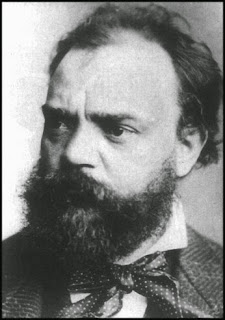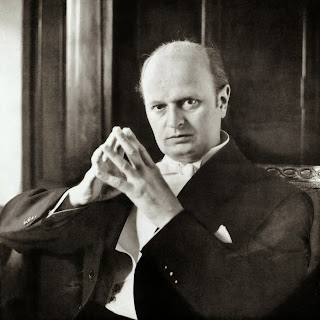Information
Composer: Antonín Dvořák; Bedřich Smetana; Franz Liszt
- Dvořák - Symphony No. 9 in E minor, Op. 95 - "From the New World": 1. Adagio - Allegro molto
- Dvořák - Symphony No. 9 in E minor, Op. 95 - "From the New World": 2. Largo
- Dvořák - Symphony No. 9 in E minor, Op. 95 - "From the New World": 3. Molto vivace
- Dvořák - Symphony No. 9 in E minor, Op. 95 - "From the New World": 4. Allegro con fuoco
- Smetana - "Má vlast" (My Country): II. Vltava (Moldau)
- Liszt - "Les préludes" (Symphonic Poem No. 3)
Berlin Philharmonic Orchestra (1-5)
Radio-Symphonie-Orchester Berlin (6)
Ferenc Fricsay, conductor
http://www.deutschegrammophon.com/en/cat/4636502
----------------------------------------------------------------
Reviews
ARTISTIC QUALITY: 10 / SOUND QUALITY: 8
A classic! Fricsay’s “New World” remains one of the most passionate and spontaneous available. Its noteworthy features include a really dramatic opening movement, a gorgeously sung Largo, a sharply rhythmic scherzo, and a grandly imposing finale sporting a couple of hugely exciting climaxes. Like few others, Fricsay had the secret of communicating a very wide-ranging flexibility of tempo without compromising rhythmic security or the long melodic line. You can hear this very clearly in the symphony’s first movement, from the second subject on through the development and up to the recapitulation. This performance hasn’t dated a bit, either interpretively or sonically, and there have been quite a few competitors since.
The couplings, a swiftly flowing Moldau and a spectacularly virile and cogent Les Préludes, have held up equally well. Few stereo recordings emanated from the baton of this genuine giant of the podium, and that makes what little we have all the more precious. I truly hope that DG gives “originals” treatment to his remaining Beethoven symphony recordings, and also to his stereo Tchaikovsky Sixth Symphony. They should be permanent fixtures in the catalog. Until then, enjoy this marvelous taste of Fricsay’s immortal art.
This is Ferenc Fricsay at his brilliant best conducting music from the Slav masters with unlimited passion and magnificence.
The 'New World' comes alive with an unbridled charisma and drive that place it amongst top New World's from Kertész, Kondrashin and Szell. The 'Largo' is indeed very beautiful yet at times it propels forward with an unerring momentum. The Finale is also very exciting indeed with supremely confident playing from the Berliners. 'Vltava' is also very characterful with the glorious orchestral music coming to life in an unerringly fresh manner.
And finally 'Les Préludes', a gem of orchestral magic that is drawn out to almost seventeen minutes, a cataclysmic piece that shows what excitement Fricsay could generate with his own orchestra. This reissue is another superb confirmation of the gifts with which Ferenc Fricsay was endowed as an interpreter and which were robbed from us all too early in his life.
------------------------------------------
Fricsay’s performances crackle with excitement. His highly subjective approach to a limited extent resembles Leonard Bernstein, but without ever being self-indulgent or overdone. The Moldau moves quickly in comparison to the slower tempos that are common now. Les Préludes is very exciting without being pompous or bombastic. In fact, the soft, pastoral, middle section with its solo harp and woodwinds is the high point of this performance. Fricsay’s “New World” Symphony is special. The second movement is nearly as slow as Leopold Stokowski’s interpretation (but Fricsay doesn’t meddle with the orchestration). The fourth movement is very dynamic despite a well-chosen middle-of-the-road basic tempo. In fact, Fricsay’s tempos are never excessive, but there are enough personal touches to make his ideas sound very individual. My principal problem with all of these works is the blatty, almost tinny brass that is very aggressive and penetrating, but works against the burnished warmth that would benefit Fricsay’s Romantic approach.
----------------------------------------------------------------
Antonín Dvořák (September 8, 1841 – May 1, 1904) was a Czech composer. Following the nationalist example of Bedřich Smetana, Dvořák frequently employed aspects, specifically rhythms, of the folk music of Moravia and his native Bohemia. He wrote nine symphonies, ten operas, three concertos, several symphonic poems and more than 40 works of chamber music.
http://en.wikipedia.org/wiki/Anton%C3%ADn_Dvo%C5%99%C3%A1k
http://en.wikipedia.org/wiki/Anton%C3%ADn_Dvo%C5%99%C3%A1k
***
Ferenc Fricsay (9 August 1914 – 20 February 1963) was a Hungarian conductor. From 1960 until his death, he was an Austrian citizen. He was known for his interpretations of the music of Mozart and Beethoven, as well as that of his teachers Bartók and Kodály. He conducted without a baton, but with extreme clarity and precision. From the 1950s until his death, he recorded for the Deutsche Grammophon.
http://en.wikipedia.org/wiki/Ferenc_Fricsay
http://en.wikipedia.org/wiki/Ferenc_Fricsay
----------------------------------------------------------------
FLAC, tracks
Links in comment
Enjoy!




This comment has been removed by the author.
ReplyDeleteThank You!
ReplyDeleteHi Ronald, track#3 has errors when checked with FLAC frontend. Could you please reload? Thanks, July59
ReplyDeleteEverything seems to be okay now.
DeleteChoose one link, copy and paste it to your browser's address bar, wait a few seconds (you may need to click 'Continue' first), then click 'Skip Ad' (or 'Get link').
ReplyDeleteIf you are asked to download or install anything, IGNORE, only download from file hosting site (mega.nz).
If MEGA shows 'Bandwidth Limit Exceeded' message, try to create a free account.
http://fumacrom.com/3AMMe
or
https://uii.io/umGj
or
https://exe.io/WtFiCk56
Perfect, thanks
ReplyDelete